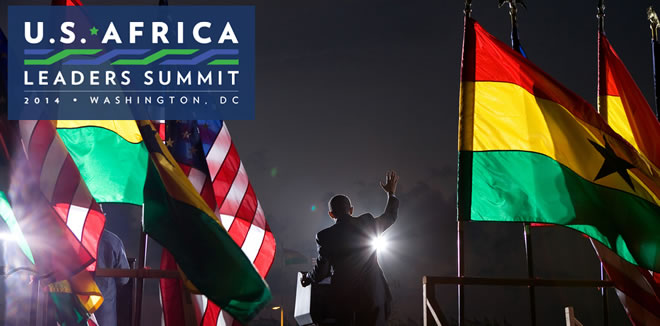
by Hamse Warfa
Wednesday, August 6, 2014
On August 4th - 6th, President Obama will welcome 41 heads of state from Africa to Washington DC for a three-day U.S.-Africa Leaders’ Summit, in what is being termed as the largest event organized by any U.S. President with African heads of state and government. According to the White House, this event ‘will build on the President’s trip to Africa in the summer of 2013 and it will strengthen ties between the United States and one of the world’s most dynamic and fastest growing regions. The theme of the Summit is "Investing in the Next Generation." Focusing on the next generation is at the core of a government’s responsibility and work, and this Summit is an opportunity to discuss ways of stimulating growth, unlocking opportunities, and creating an enabling environment for the next generation.’
The timing and the theme of this summit is fitting given the significant opportunity that exist today in integrating the continent’s economies and opening up business and employment opportunities for the people, especially, the continent’s youth who are eager to embark on innovative projects that will improve the conditions of their people. During my last month’s visit to Uganda, Kenya, Ethiopia and Somalia, I met with government and civil society leaders who all discussed the desire and the need for wealth generation and employment creation in order to achieve sustainable political and social-economic development.
But US-Africa leaders’ summit must deliver tangible results for the continent and its people. If the past high profile, Africa related events in the West are any guide, those who have high expectations of this summit must hold their breath as this might lead to nothing more than a rhetoric that will not produce anything meaningful for the continent. To be impactful, the leaders must devote their focus on crafting ways to provide economic and leadership opportunities for the continent’s youth who are facing formidable challenges including poverty, unemployment, high crime and lack of education.
Somali Youth as a Case in Point
Owing to a number of factors beyond their reach, Somali youth are among the most disenfranchised population in the world. And the statistics aren’t enthralling. Close to 75% of Somalis in Somalia are youth less than 35 years old, most of who were born in battle fields and refugee camps. As a result, over 80% of Somali’s youth never had formal education. And as they become of age, there’s no sustainable economic activity to engage in or clear programs to harness their energy.
For a state that has been at war with itself for two decades, attempts at political reconciliation and institutional building have claimed the bulk of the international community’s intervention efforts. For instance, a summit co-sponsored by Britain and Somalia’s federal government last year was convened to help the government of Somalia deliver on key national priorities. This included rebuilding of the national army in the face of increasing threat of instability from the Alshabaab terror group, training of the police force and setting up of a coastguard, creation of judicial institutions, as well as improving the country’s public financial management systems. To date, the Somali government has not delivered most of these. Some analysts have been quick to point out that majority of such foreign interventions in Somalia have largely been driven by foreign interests as opposed to genuine desire to ease Somalia out of its dire situation. For instance, it didn’t escape critics’ attention that while there was much zeal to help tackle piracy on Somalia’s international waters, there was hardly any attention given to tackle the real issues that predispose Somali youth to such criminal tendencies in the first place.
Way Forward
In a business setup, the most important resource in an organization remains its human resource. It is the people’s brain power that creates wealth for organizations and the nation at large. Looking at Somali youth, I see great zeal for life, despite the odds that they have overcame. The US-Africa summit has a great role to play in harnessing the energy of youth in Africa by presenting opportunities for wealth creation and leadership development.
Such a strategy will definitely require an approach that looks at the immediate problem, while doing its best to safeguard the continent’s future human resource needs. As an immediate strategy, African leaders must work together to address the formidable challenges facing their youth by channeling their energy positively by providing them opportunities to contribute to the developmental agenda of the continent.
In the case of Somalia, a long term strategy should include providing educational opportunities for Somali youth. Education is the single most potent weapon with which to slay poverty. We must take a humanistic perspective driven by a concern for the future of the country’s youth, 75% of whom have no employment or means of earning income. It is no wonder that according to a UNDP report published in 2012, two-thirds of Somali youths would wish to leave the country. US-Africa summit has an opportunity to address this. Will they seize it?
by Hamse Warfa
Email: [email protected]